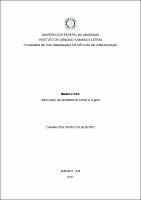| ???jsp.display-item.social.title??? |


|
Please use this identifier to cite or link to this item:
https://tede.ufam.edu.br/handle/tede/7534| ???metadata.dc.type???: | Dissertação |
| Title: | NeuroVidas: uma visão ecossistêmica sobre o sujeito |
| ???metadata.dc.creator???: | Gualberto, Daiana dos Santos  |
| ???metadata.dc.contributor.advisor1???: | Pinto, Ernesto Renan Melo de Freitas |
| First advisor-co: | Martini, Carmen Silvia da Silva |
| ???metadata.dc.contributor.referee1???: | Pereira, Mirna Feitoza |
| ???metadata.dc.contributor.referee2???: | Fernandes, Tiótrefis |
| ???metadata.dc.description.resumo???: | Essa dissertação tem o objetivo de apresentar uma visão ecossistêmica sobre o sujeito a partir de narrativas autobiográficas de sujeitos com disfunção neurológica no ciberespaço. A construção teórica dessa visão ecossistêmica parte dos estudos transdisciplinares sobre Ecossistemas Comunicacionais no âmbito do Programa de Pós-Graduação em Ciências da Comunicação da Universidade Federal do Amazonas, das contribuições das teorias dos sistemas, em especial a visão sistêmica de Fritjof Capra e Luigi Luisi, a hermenêutica filosófica de Hans-Georg Gadamer e os estudos sobre sujeitos com disfunção neurológica. O percurso metodológico constou primeiramente de uma pesquisa exploratória no ciberespaço, buscando identificar as narrativas autobiográficas dos sujeitos com disfunção neurológica; o material selecionado foi estudado e os dados obtidos foram interpretados à luz da hermenêutica filosófica e fundamentados por uma pesquisa bibliográfica. A visão dos ecossistemas comunicacionais direcionada aos sujeitos com disfunção neurológica foi denominada de “NeuroVidas”. Verificou-se que os sujeitos com disfunção neurológica narram suas vidas no ciberespaço, se comunicam com outros sujeitos, constroem relações online, criam identidades de grupos; eles podem transcender o ciberespaço, criando relações físicas e atuando na sociedade como sujeitos empoderados. Os sujeitos articulam-se em prol da divulgação de informações mais verídicas sobre as disfunções/doenças, de forma a favorecer a conscientização da sociedade sobre as suas condições de saúde e de vida. Além disso, reivindicam seus direitos, incentivam o empoderamento dos outros sujeitos com disfunção neurológica e passam a ver as doenças por olhares mais positivos. Como resultado foi possível identificar através das narrativas autobiográficas aspectos sobre os sujeitos com disfunção neurológica que auxiliaram na construção de uma visão ecossistêmica sobre o sujeito. Essa pesquisa reconheceu a existência de uma dinâmica complexa de interação entre o sujeito, seus vários subtipos e os contextos em que estão inseridos. |
| Abstract: | This dissertation aims to present an ecosystemic view of the subject from autobiographical narratives of subjects with neurological dysfunction in cyberspace. The theoretical construction of this ecosystem view starts from the transdisciplinary studies on Communication Ecosystems within the Postgraduate Program in Communication Sciences of the Federal University of Amazonas, from the contributions of systems theories, especially the systemic view of Fritjof Capra and Luigi Luisi, The philosophical hermeneutics of Hans-Georg Gadamer and the studies on subjects with neurological dysfunction. The methodological course consisted first of an exploratory research, of unsystematic observation in the cyberspace, seeking to identify the autobiographical narratives of the subjects with neurological dysfunction; The selected material was studied and the data obtained were interpreted in the light of philosophical hermeneutics and based on a bibliographical research. The application of the vision of the communicational ecosystems directed to the subjects with neurological dysfunction was denominated of "NeuroVidas". It has been found that subjects with neurological dysfunction narrate their lives in cyberspace, communicate with other subjects, build relationships online, create group identities; They can transcend cyberspace, creating physical relationships and acting in society as empowered subjects. The subjects articulate themselves in favor of the dissemination of more truthful information on the dysfunctions / diseases, in order to promote the society's awareness about their health and life conditions. In addition, they claim their rights, encourage the empowerment of other individuals with neurological dysfunction, and begin to see diseases through more positive looks. As a result, it was possible to identify through the autobiographical narratives aspects about the subjects with neurological dysfunction that helped in the construction of an ecosystemic view about the subject. This research acknowledged the existence of a complex dynamic of interaction between the subject, its various subtypes and the contexts in which they are inserted. |
| Keywords: | Ciberespaço Memória autobiográfica Neurologia |
| ???metadata.dc.subject.cnpq???: | CIÊNCIAS SOCIAIS APLICADAS: COMUNICAÇÃO |
| ???metadata.dc.subject.user???: | Comunicação Ecossistemas Comunicacionais Sujeitos Neurologia Narrativa Autobiográfica Ciberespaço |
| Language: | por |
| ???metadata.dc.publisher.country???: | Brasil |
| Publisher: | Universidade Federal do Amazonas |
| ???metadata.dc.publisher.initials???: | UFAM |
| ???metadata.dc.publisher.department???: | Instituto de Ciências Humanas e Letras |
| ???metadata.dc.publisher.program???: | Programa de Pós-graduação em Ciências da Comunicação |
| Citation: | GUALBERTO, Daiana dos Santos. NeuroVidas: uma visão ecossistêmica sobre o sujeito. 2017. 111 f. Dissertação (Mestrado em Ciências da Comunicação) - Universidade Federal do Amazonas, Manaus (AM), 2017. |
| ???metadata.dc.rights???: | Acesso Aberto |
| ???metadata.dc.rights.uri???: | http://creativecommons.org/licenses/by-nd/4.0/ |
| URI: | https://tede.ufam.edu.br/handle/tede/7534 |
| Issue Date: | 30-May-2017 |
| Appears in Collections: | Mestrado em Ciências da Comunicação |
Files in This Item:
| File | Description | Size | Format | |
|---|---|---|---|---|
| Dissertação_DaianaGualberto_PPGCCOM.pdf | 2.23 MB | Adobe PDF |  Download/Open Preview |
This item is licensed under a Creative Commons License





